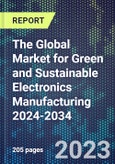The electronics industry has witnessed massive growth over the past few decades, with electronic devices becoming an integral part of modern life. However, this growth has also led to significant environmental impacts, including high energy consumption, resource depletion, and electronic waste (e-waste). According to the UN, waste electronics is the fastest growing and most hazardous waste stream globally. This has resulted in an increasing need to make electronics manufacturing more sustainable and environmentally friendly, leading to the emergence of "green electronics" as an approach to reducing the electronics industry's environmental footprint.
Development of sustainable printed circuit board (PCB) designs has grown recently as part of the push for green manufacturing. Traditional PCB manufacturing relies on energy intensive and high-emission processes that involve copper, epoxy resin, glass fiber, and water that are harmful to the environment. Recycling techniques have low efficiency and include laborious processes.
New materials are being utilized that are easily recyclable, and biodegradable polymers and paper PCBs are used in PCB manufacturing. Environmentally friendly etchants for existing subtractive processes and additive manufacturing such as inkjet and laser printing is also increasingly utilized. By employing additive methods, energy consumption during manufacturing can be even five times less than with conventional methods. Sustainable and printable substrate materials including different cellulose and wood-based materials, bioplastics, and biocomposites have been developed.
The Global Market for Green and Sustainable Electronics Manufacturing 2024-2034 provides a comprehensive analysis of the global green electronics manufacturing industry. The report covers industry trends, drivers, challenges, approaches, technologies, materials, processes, and leading companies across printed circuit boards (PCBs), integrated circuits (ICs), batteries, assembly, and the electronics supply chain. Market revenues and forecasts are provided for sustainable PCBs and ICs, segmented by substrate and process types, through 2034.
The report profiles 40 innovative companies offering greener materials, chemistries, equipment and manufacturing services enabling the transition to more circular, lower carbon electronics. Multiple tables summarize key manufacturers, processes, materials, and sustainability strategies for green electronics.
Analysis is provided on trends in renewables, additive processes, biobased and recycled materials, toxicity reduction, supply chain transparency, e-waste recovery, and life cycle optimization to minimize electronics' environmental footprint. The report helps electronics OEMs, PCBs, ICs, EMS companies and suppliers benchmark sustainability efforts and identify new opportunities.
Report contents include:
- Overview of green electronics manufacturing and drivers for sustainability such as e-waste reduction, lower emissions, and resource efficiency.
- Analysis of environmental impacts like carbon emissions, water usage, and waste.
- Regulations and certifications promoting sustainable electronics.
- Powering electronics through renewable batteries.
- Use of bioplastics for injection molded parts.
- Comparison of conventional vs sustainable manufacturing approaches.
- Analysis of strategies including renewable energy, materials efficiency, sustainable chemistry, recycled materials, and supply chain management.
- Sustainable PCB manufacturing including materials, substrates, patterning, component attachment.
- Sustainable integrated circuits manufacturing.
- End-of-life considerations for electronics.
- Global PCB market size and forecast 2018-2034.
- Sustainable PCB and IC revenue forecasts segmented by technology type.
- Profiles of 40 companies providing green materials, equipment, and manufacturing services. Companies profiled include DP Patterning, Elephantech, Infineon Technologies, Jiva Materials, Samsung, Syenta, and Tactotek. Additional information on bio-based battery, conductive ink, green & lead-free solder and halogen-free FR4 companies.
This product will be delivered within 1-3 business days.
Table of Contents
Companies Mentioned (Partial List)
A selection of companies mentioned in this report includes, but is not limited to:
- AlixLabs AB
- Alpha Assembly Solutions
- Altana AG (Heliosonic GmbH)
- Arctic Biomaterials Oy
- Arjowiggins Group
- Arkema S.A
- BeFC
- Celus GmbH
- CondAlign AS
- DP Patterning AB
- ElectraMet
- Elephantech, Inc.
- Enlipsium
- Fairphone B.V.
- Flexciton Limited
- Green Li-ion
- Green Mineral, Inc.
- Imec
- In2tec
- Infineon Technologies AG
- Intel
- IOTech Group Ltd.
- Jiva Materials Ltd.
- Kieron Printing Technologies BV
- Luminovo GmbH
- Mint Innovation
- NanoOPS, Inc
- Navitas Semiconductor
- NEU Battery Materials
- Oji Paper Company
- Pragmatic Semiconductor
- Rongna New Energy
- Sabic
- SAFI-Tech
- Samsung
- Soitec
- Stora Enso Oyj
- Sunray Scientific
- Syenta
- TactoTek Oy
- Taiwan Semiconductor Manufacturing Company Limited (TSMC)
- Toray Industries
- Verde Bioresins, Inc.
- VTT








